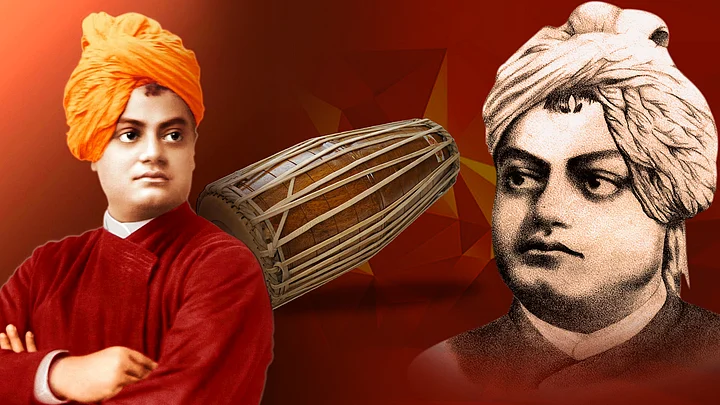(This article was originally published on 12 January 2016. On Swami Vivekananda’s death anniversary, The Quint is republishing this piece from its archives, on 4 July 2022.)
Swami Vivekananda, best known as the monk who modernised Hinduism and took Vedanta to the West, was also a very proficient musician. Born Narendranath Datta, it was while growing up in his ancestral house in north Calcutta that his love of and prowess for music came to the fore.
While his father Vishwanath Datta, a trained classical musician, taught him the rudiments of Dhrupad, one of the oldest schools of Hindustani classical music, mother Bhuvaneshwari Devi familiarised Vivekananda with traditional devotional music and plays dedicated to Krishna.
While very young he was tutored by Ahmad Khan and Beni Gupta, two well-known musicians of his time. He studied and practised vocal as well as instrumental music for about five years under them and true to his name, Vivekananda, which means ‘the one who exults in a clear conscience and in discernment’, quickly grasped the intricacies of Indian classical music and instruments that often take a lifetime to master.
Accompolished Pakhawaj Player
Vivekananda learnt to play the Pakhawaj from Murari Gupta, mastering the complicated Dhamar ‘tala’ or beat the percussion instrument is renowned for. Before he turned twenty, Vivekananda was an accomplished singer in Dhrupad and a much sought after Pakhawaj player. He participated in several concerts in Kolkata.
“He had a beautiful voice, like a violincello, grave and even, whose reverberations filled both hall and hearts. Once he had enraptured his audience, he could make it sink to an intense “piano”, piercing the soul of his listeners,” French Nobel laureate Romain Rolland says in the book The Monk as a Man: The Unknown Life of Swami Vivekananda.
Young Narendranath is said to have been adept at singing bhajans and knew musical compositions in various languages like Bengali, Hindi, Urdu, Persian and Sanskrit.
“Swami Vivekananda had been blessed by Nature with all the primary requirements of music. He had added great refinement to this gift by his deep knowledge of its technique as also by strenuous practice,” says Swami Harshananda in his piece ‘Music and Vivekananda’ published in Vedanta Kesari.
Ramkrishna Bua Vaze, a well-known khyal exponent of the Gwalior gharana talks about his visit to Vivekananda’s ashram in Bareilly.
Swamiji would wake up early in the morning, tune his two tanpuras and sing a morning melody Ahir Bhairav, specifically a Tansen dhrupad composition to wake up the ashramites.Ramkrishna Bua Vaze
A Spiritual Genius
Vivekananda also authored a book on Indian and Bengali music. This 479-page book titled Sangeeta Kalpataru was first published in 1887 and lists Narendranath Datta as the author. Out of print for years, it was reprinted and released by the Ramakrishna Mission Institute of Culture in 2000.
Dr Sharbananda Choudhury, a research scholar writes about how a 23-year-old Vivekananda started writing this book and compiling its collection of songs. The book begins with a 90-page treatise on music written by the monk, followed by a collection of songs compiled by him and an appendix with introductions to 17 lyricists.
Like a lot of Western classical music ancient Indian music often had religion as its basis. Essentially religion was used in music as a means of expressing devotion to and realising God. Nadopasana (meditation through music) was considered to be highly efficacious in religious life.
Along with devotional songs, the songbook consists of songs on subjects ranging from the motherland, love, history, religion and social issues. Sangeeta Kalpataru presents songs by more than 176 composers on religious themes, social issues, the Puranas, besides patriotic songs.Dr Sharbananda Choudhury, Research Scholar
Unfortunately by the time the fourth edition was published, Vivekananda’s associate Vaishnav Charan Basak had substituted the author’s name with his and Vivekananda’s contribution would be celebrated only after 112 years, when the book was reprinted.
(Abir Pal is a journalist and communication professional based in Kolkata.)
